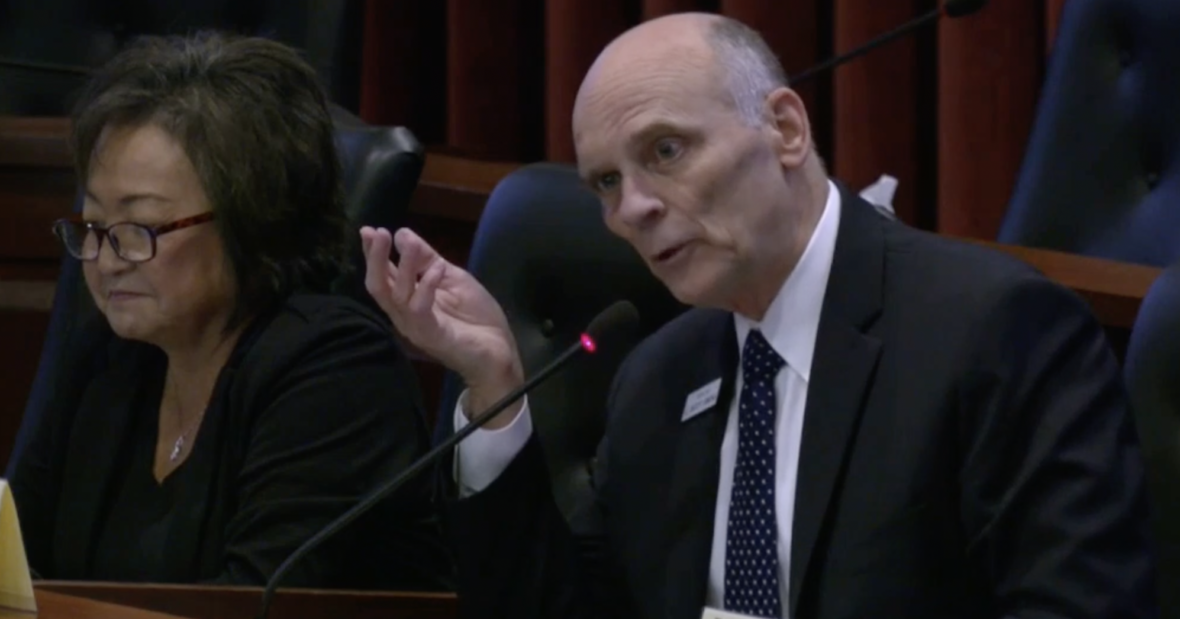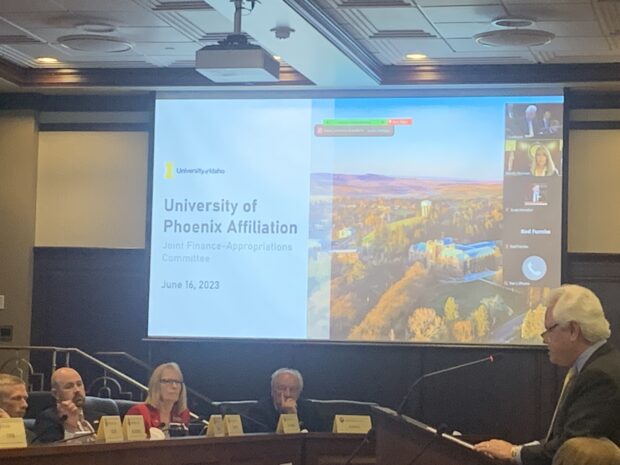
Legislative budget-writers have serious questions about the math — and the secrecy — behind the University of Idaho’s plan to purchase the University of Phoenix.
In a rare midsummer meeting, Joint Finance-Appropriations Committee members spent two hours Friday morning quizzing U of I President C. Scott Green about the $685 million Phoenix acquisition. The U of I abruptly announced the proposed purchase on May 18 — to the surprise of nearly everyone in Idaho’s political and education circles.

On Friday, JFAC members pushed back, questioning the non-disclosure agreement between the U of I and Phoenix, which required the state’s flagship public university to negotiate behind closed doors for two months.
“We feel we should have been involved in that process,” said JFAC’s Senate co-chair, C. Scott Grow, R-Eagle.
If the Phoenix purchase goes through — and U of I officials hope to have a deal in place in early 2024 — the Legislature’s role appears uncertain.
U of I officials have stressed that the transaction does not involve, or jeopardize, taxpayer dollars. A nonprofit entity with ties to the U of I — NEW Idaho Education Initiatives Inc., originally dubbed NewU — would issue bonds to cover the Phoenix purchase. U of I officials say revenues from Phoenix’s robust online programs would easily cover the financing, and provide U of I at least $10 million in annual revenues. However, the U of I would pledge to pay up to $10 million a year, if NEW Idaho Education Initiatives couldn’t cover bond payments.
JFAC members wanted to drill down on the projected revenues — and how the U of I might spend it. Rep. Britt Raybould, R-Rexburg, asked if the Phoenix proceeds would be a standalone revenue source for the U of I, separate from the state tax dollars JFAC distributes to public colleges and universities.
Green said he wasn’t sure how these funds would fit into the budget process, since the U of I would not be asking for an appropriation. But he said the U of I would report how it spends this Phoenix revenue — which could eventually include an endowment for Idaho students who want to take Phoenix classes, or academic pathways linking Phoenix and U of I programs.
Rep. James Petzke, R-Meridian, said it appeared unlikely that the U of I would ever be on the hook to cover Phoenix bond payments, but he asked Green if the U of I was prepared to absorb that cost. Green again said the U of I could cover this $10 million from reserves, or a host of other funds.
Friday’s meeting marked the U of I’s second discussion with legislators about the Phoenix purchase; the U of I held a virtual town hall on June 1. But Friday’s meeting, dubbed a “JFAC Oversight Hearing,” had a number of civil but pointed moments.
Several of those exchanges centered on the NDA.
“We should be able to see everything,” said Rep. Josh Tanner, R-Eagle, as he urged Green to sever the NDA.
Green said only Phoenix can break the NDA — and he said the agreement still protects the company, as the negotiations continue.
“If I were them, I’d not do it,” Green said.
But at a couple of stages in the hearing, Green stressed that the NDA helped the university as well — allowing its officials to take a deep dive into Phoenix’s financials, before going public on the proposed purchase.
Rep. Wendy Horman, JFAC’s House co-chair, wanted more details about the State Board of Education’s closed-door discussions of the purchase in the weeks leading up to the U of I’s May 18 announcement. The State Board held three executive sessions to discuss the deal, citing state law allowing closed-door meetings for “preliminary negotiations” when an Idaho entity is “in competition with governing bodies in other states or nations.”
Green insisted the State Board’s discussions were preliminary — even though they gave the purchase the go-ahead in its sole public meeting on May 19. And State Board executive director Matt Freeman said U of I was competing against Phoenix suitors in two other states.
No JFAC member spoke in outright opposition to the purchase — which would partner the U of I with an online university with 85,000 students, decades of experience serving nontraditional adult learners, and a checkered history that includes a $191 million settlement with the Federal Trade Commission.
But skepticism was readily evident.
“We see that this transaction has potential, but we also see that it has risk,” said Horman, R-Idaho Falls. “We want to trust but we must verify.”
That sentiment came through another exchange Friday, as Green answered a wide-ranging question from Grow.
“I guess I take issue with a lot that was said there, including that the risks are unknown,” Green said.
“They’re unknown to us,” said Grow. “That’s the problem here, is they’re unknown to us, and so that’s why we’re having this hearing.”
Podcast: Listen to U of I President C. Scott Green address the Phoenix purchase.
